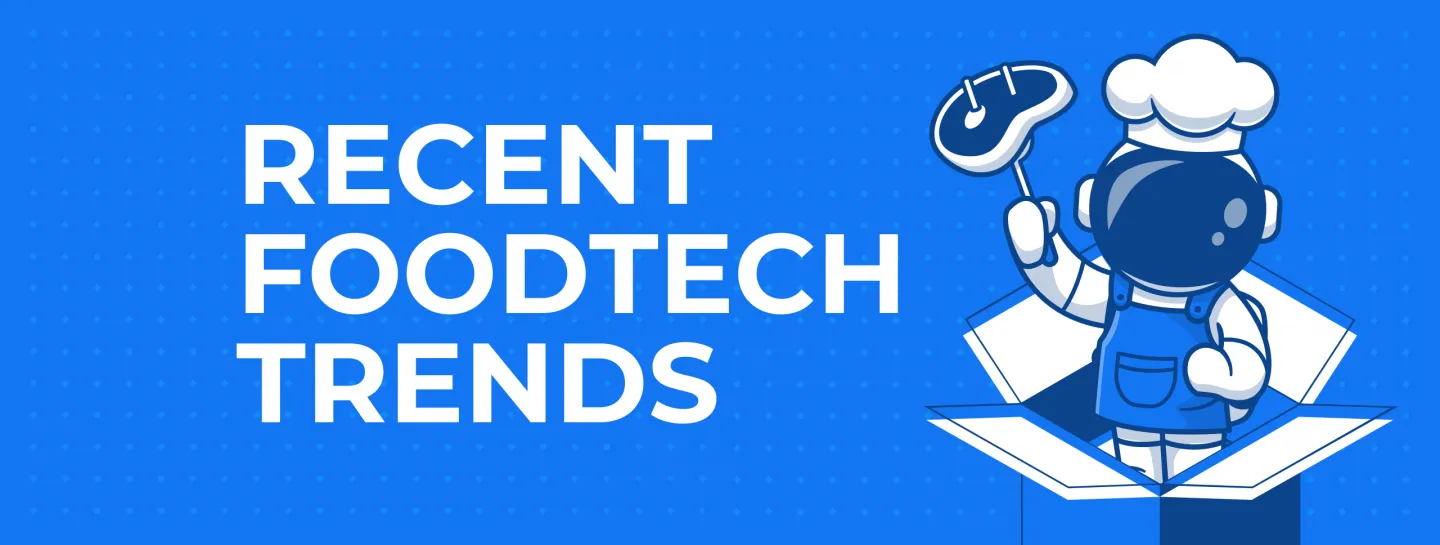
Top Trends for Food Tech and Automation in 2023

The present-day challenges that humankind is facing dictate the way foodtech is developing. The environmental degradation is obvious. The world population is growing and will reach the point of 10 billion people by 2050. Meanwhile, the desire to maintain an active lifestyle and to eat healthier is ubiquitous. It is like a double-edged sword, where we should choose the third variant and create new ways to feed the whole planet without any slight harm to its ecosystem.
The food and agriculture industries generate about 20% of global GHG emissions. The good news is that the financial investment flows in this sector are growing, reaching $10.7bn in H2 2020–H1 2021, and moreover, the food system is a harbour for 13 unicorns out of 78, which is the second-highest number among the cleantech spheres.
Personalized nutrition
People nowadays want to keep themselves in tip-top condition and, as a result, are becoming more discerning about the food they eat. Israeli scientists have discovered that each body reacts to the same food individually, and sometimes the reaction varies a lot. It depends on the individual's genome, microbiome, and epigenetics. This can be a basis for personalized food creation. Some laboratories have already suggested a DNA test to coordinate your diet. Based on the test results and your tastes, a mobile app with the help of AI will construct your perfect turnkey menu. And then, as an icing on the cake, when you come home, your perfect supper, a plant steak, will be ready on a 3D food printer.
Food printing. Alternative protein sources: plant-based food
The technology already exists with space food, for example, but soon it will be a common and usual routine in every house. Just fill in food capsules with fresh ingredients and design your dinner. Add preferable shape, texture, and presto, help yourself. The 3D food printing industry facilitates plant-based production that looks like real meat with blood and fat, copying its structure and juiciness. One more plus of 3D food printing is waste reduction and a lower ecological footprint.
Laboratories and companies keep experimenting with the ways of the meat creation, and many of them have their own unique recipe for plant protein. For instance, fermentation helps to create “meat” from edible fungi. Mix soy plants DNA with a genetically engineered yeast and you will get a vegetarian sausage. The only question is to change people's thought-patterns and make them take plant food seriously.
Cultured protein
Besides methane emissions, cattle breeding uses a huge amount of land and water resources; farmers also have to give antibiotics, which entails the antibiotic resistance crisis. This can be avoided by using the existing technology: lab-grown meat. Steaks are created by scientists in clean lab conditions (later factories) from animal cells without cruelty or hormones, saving over 95% of water and land resources. The variant suits those who don’t want to refuse meat but want to help the planet. Cell-cultured chicken meat is already allowed to be used in Singapore. The undoubted advantage is the possibility to grow a preferable type of meat with lower levels of cholesterol. The companies now are striving to slash prices to the ordinary meat level or even to make it more competitive.
Green Packaging and Waste Reduction
E-commerce is another child of foodtech development that in a moment has made our life easier. However, the delivery market produces mountains of useless waste. One-time packaging could be a symbol of ecological catastrophe. That is why food packaging is so important to develop. “Packaging that doesn’t cost the earth” is an inspiring slogan of the BioPak company. Their cups, containers, and plates are made from plants, and are fully biodegradable. Sun-dried areca palm leaves or sugarcane, seaweed or mycelium–the variants are so extensive! Ecovative constructs stunning alternatives to styrofoam made from hemp and mycelium. Sustainable packaging start-ups can be listed endlessly.
Foodtech apps also have the superpower to confront food waste catastrophes. There are apps that help restaurants sell food that is intended to be disposed of at a discount. In some cities, this food is delivered by remote-controlled delivery vehicles. IoT sensors inside let customers track orders and businesses control storage conditions inside vehicles. In restaurants and food warehouses, IoT technology in cooperation with AI and, maybe, drones controls all storage processes: temperature and humidity, shelf life, delivery dates, and so on. The inventory is taken constantly, in real time. These solutions lead foodtech to a sustainable future.
It is impossible to predict the future of foodtech and the whole gastronomy because food trends are so multifaceted, but, nevertheless, if you have an idea, Magora is always there to provide expert advice and help with bespoke app development of any complexity.





